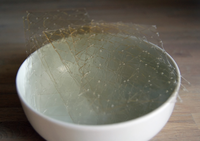
Bio-Inspired Antioxidant Heparin-Mimetic Peptide Hydrogel for Radiation-Induced Skin Injury Repair.
Sign Up to like & getrecommendations! Published in 2023 at "Advanced healthcare materials"
DOI: 10.1002/adhm.202203387
Abstract: Radiotherapy is one of the most important means of cancer treatment, however, radiation can also cause adverse reactions and even serious injuries to the skin. Radiation-induced excess reactive oxygen species (ROS) production and inflammatory infiltration… read more here.
Keywords: skin injury; hydrogel; induced skin; radiation ... See more keywords

Role of N6-methyladenosine RNA modification in the imbalanced inflammatory homeostasis of arsenic-induced skin lesions.
Sign Up to like & getrecommendations! Published in 2022 at "Environmental toxicology"
DOI: 10.1002/tox.23530
Abstract: This study aimed to investigate the effect of N6-methyladenosine (m6 A) modification in modulating inflammatory homeostasis of arsenic (As)-induced skin lesions. Our bioinformatic analysis revealed abnormal expression of m6 A RNA methylation regulators and cytokines… read more here.
Keywords: inflammatory homeostasis; arsenic induced; skin lesions; induced skin ... See more keywords

Retinoic acid co-treatment aggravates severity of dioxin-induced skin lesions in hairless mice via induction of inflammatory response.
Sign Up to like & getrecommendations! Published in 2018 at "Biochemical and biophysical research communications"
DOI: 10.1016/j.bbrc.2018.10.126
Abstract: Exposure to toxic halogenated polyaromatic hydrocarbons, of which 2,3,7,8-tetrachlorodibenzo-p-dioxin (TCDD) is the most potent, induces diverse skin pathologies in humans, including chloracne, hyperkeratosis, hamartomas, etc. While the toxic effects of TCDD have been extensively studied,… read more here.
Keywords: tcdd induced; tcdd; treatment; hairless mice ... See more keywords

18β-Glycyrrhetinic acid mitigates radiation-induced skin damage via NADPH oxidase/ROS/p38MAPK and NF-κB pathways.
Sign Up to like & getrecommendations! Published in 2018 at "Environmental toxicology and pharmacology"
DOI: 10.1016/j.etap.2018.04.012
Abstract: Radiation-induced inflammation plays an important role in radiation-induced tissue injury. 18β-glycyrrhetinic acid (18β-GA) has shown an anti-inflammatory activity. This study aimed to assess the activity of 18β-GA against radiation-induced skin damage, and explore the underlying… read more here.
Keywords: glycyrrhetinic acid; radiation induced; induced skin; skin damage ... See more keywords

Inhibitory Effect of Quercetin on Propionibacterium acnes-induced Skin Inflammation.
Sign Up to like & getrecommendations! Published in 2021 at "International immunopharmacology"
DOI: 10.1016/j.intimp.2021.107557
Abstract: Quercetin is a well-known antioxidant and a plant polyphenolic of flavonoid group found in many fruits, leaves, and vegetables. Propionibacterium acnes is a key skin pathogen involved in the progression of acne inflammation. Although quercetin… read more here.
Keywords: propionibacterium acnes; inflammation; skin inflammation; induced skin ... See more keywords

Vascular Endothelial Growth Factor as an Immediate-Early Activator of Ultraviolet-Induced Skin Injury.
Sign Up to like & getrecommendations! Published in 2021 at "Mayo Clinic proceedings"
DOI: 10.1016/j.mayocp.2021.08.018
Abstract: The negative health consequences of acute ultraviolet (UV) exposure are evident, with reports of 30,000 emergency room visits annually to treat the effects of sunburn in the United States alone. The acute effects of sunburn… read more here.
Keywords: vegf; vascular endothelial; endothelial growth; growth factor ... See more keywords

Cathelicidin-NV from Nanorana ventripunctata effectively protects HaCaT cells, ameliorating ultraviolet B-induced skin photoaging
Sign Up to like & getrecommendations! Published in 2022 at "Peptides"
DOI: 10.1016/j.peptides.2021.170712
Abstract: Cathelicidins are diverse effector molecules in the vertebrate immune system and are related to immune regulation, inflammatory response, wound healing, and blood vessel formation. However, little is known about their free radical scavenging ability, especially… read more here.
Keywords: nanorana ventripunctata; cathelicidin; induced skin; skin photoaging ... See more keywords

Prevention and Repair of Ultraviolet B-Induced Skin Damage in Hairless Mice via Transdermal Delivery of Growth Factors Immobilized in a Gel-in-Oil Nanoemulsion
Sign Up to like & getrecommendations! Published in 2023 at "ACS Omega"
DOI: 10.1021/acsomega.2c07343
Abstract: Ultraviolet (UV) radiation from the sun or artificial sources is one of the primary causes of skin damage, including sunburns, tanning, erythema, and skin cancer. Among the three different types of UV rays, UVB rays… read more here.
Keywords: skin damage; induced skin; growth factor; damage ... See more keywords

Suppression of the solar ultraviolet-induced skin carcinogenesis by TOPK inhibitor HI-TOPK-032
Sign Up to like & getrecommendations! Published in 2020 at "Oncogene"
DOI: 10.1038/s41388-020-1286-4
Abstract: Nonmelanoma skin cancer (NMSC) such as cutaneous squamous cell carcinoma (cSCC) is caused by solar ultraviolet (SUV) exposure and is the most common cancer in the United States. T-LAK cell-originated protein kinase (TOPK), a serine-threonine… read more here.
Keywords: solar ultraviolet; skin carcinogenesis; topk; induced skin ... See more keywords

Effect of adenosine triphosphate on ribociclib-induced skin toxicity in rats
Sign Up to like & getrecommendations! Published in 2023 at "Cutaneous and Ocular Toxicology"
DOI: 10.1080/15569527.2023.2166524
Abstract: Abstract Purpose Ribociclib is a CDK4/6 inhibitor approved for the treatment of breast cancer; it inhibits the activity of CDK4/6 by competitively binding to adenosine 5'-triphosphate (ATP) binding sites. Although generally well-tolerated, ribociclib has been… read more here.
Keywords: induced skin; ribociclib induced; ribociclib; group ... See more keywords

Proteomic and miRNA profiling of radon-induced skin damage in mice: FASN regulated by miRNAs
Sign Up to like & getrecommendations! Published in 2022 at "Journal of Radiation Research"
DOI: 10.1093/jrr/rrac037
Abstract: Abstract Radon is a naturally occurring radioactive gas and considered as a serious carcinogen to humans. Continuous radioactive decay of this gas emits high-energy alpha particles. Long-term radon exposure induces oxidative stress and inflammatory response,… read more here.
Keywords: damage; induced skin; radon induced; skin damage ... See more keywords